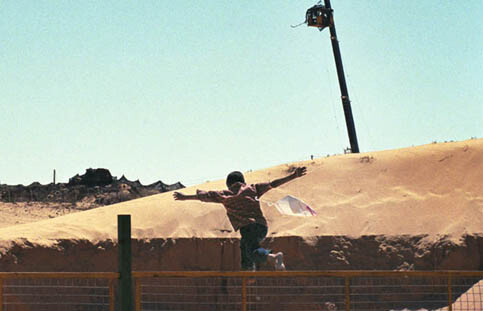7 June 2003

Photo: Ronald de Hommel, 2002
The Government of Israel this week commenced the process of releasing around 100 Palestinian detainees from prisons and detention centres across Israel and the West Bank. Of the names announced for scheduled release, not one is an imprisoned child.
Defence for Children International / Palestine Section condemns the gesture politics of the Israeli Government and calls for the urgent and unconditional release of all Palestinian child prisoners. Children remain the most vulnerable group affected by the policies of occupation. Constituting 53% of the Palestinian population they are also disproportionately impacted.
DCI/PS believes that this failure to release child prisoners is a missed opportunity for the Israeli Government to demonstrate its commitment to a viable and lasting peaceful settlement and urges the international community to remember that the Road Map process must not leave behind the children of Palestine.
DCI/PS notes that the Government of Israel remains in flagrant and wilful violation of the United Nations Convention on the Rights of the Child (CRC) - a treaty which Israel ratified in 1991 but continues to refuse to apply to Palestinian children.
Article 37 of the UN Convention of the Rights of the Child states:
“(a) No child shall be subjected to torture or other cruel, inhuman or degrading treatment or punishment. Neither capital punishment nor life imprisonment without possibility of release shall be imposed for offences committed by persons below eighteen years of age;
(b) No child shall be deprived of his or her liberty unlawfully or arbitrarily. The arrest, detention or imprisonment of a child shall be in conformity with the law and shall be used only as a measure of last resort and for the shortest appropriate period of time;”
330 Palestinian children remain in captivity. DCI/PS research indicates that almost every single Palestinian child detainee reports some form of torture during the process of arrest, detention, trial and imprisonment - either physical or psychological. ” The number of administrative detainees - those imprisoned without specific charges for up to 6 months at a time - increased sixteenfold to 32 cases between 2001 and 2002. The proportion of child prisoners released after a month in captivity halved between 2001 and 2002. Israeli military courts routinely impose excessive sentences. Children accused of throwing stones or molotov cocktails regularly receive sentences of 1-3 years. Imprisonment is frequently the measure of first resort for the Israeli military courts.
DCI/PS research indicates numerous cases where testimonies have been falsified by Israeli soldiers to indict Palestinian children. “(c) Every child deprived of liberty shall be treated with humanity and respect for the inherent dignity of the human person and in a manner which takes into account the needs of persons of his or her age. In particular, every child deprived of liberty shall be separated from adults unless it is considered in the child’s best interest not to do so and shall have the right to maintain contact with his or her family through correspondence and visits, save in exceptional circumstances;
(d) Every child deprived of his or her liberty shall have the right to prompt access to legal and other appropriate assistance, as well as the right to challenge the legality of the deprivation of his or her liberty before a court or other competent, independent and impartial authority and to a prompt decision on any such action.”
Visitation rights are routinely denied to Palestinian child prisoners, for both family members as well as legal counsel - especially during the process of interrogation. Palestinian child prisoners are not provided with legal representation by Israeli military courts. DCI/PS research indicates that the majority of families affected cannot afford independent legal representation. 30% of imprisoned children are being held in temporary detention centres across the West Bank in inhuman conditions where there are cases of up to eleven children packed into cells as small as five square metres in the case of Bet El military detention centre. In Bet El temporary detention centre, children are allowed a 30 minute break once a week. In contravention with the United Nations Rules on the Administration of Juvenile Justice, child prisoners are routinely held with adult prisoners.
Call to action
DCI/PS calls for the immediate and unconditional release of Palestinian child political prisoners and for Israel to abide by international law - especially Article 37 of the Rights of the Convention on the Rights of the Child.
The Israeli Government must immediately desist from the torture, harassment and abuse of Palestinian children and respect the basic rights of children under detention as articulated in the United Nations Rules on the Administration of Juvenile Justice.
Defence for Children International / Palestine Section additionally calls for Israel to:
Protect Palestinian child prisoners from physical and mental violence. Improve Palestinian children’s conditions of detention in Israeli prisons and interrogation centres. Enforce Palestinian children’s rights to adequate legal defence and family visits. Halt the process of child arrests by Israeli forces.
For further information:
DCI/PS, P.O. Box 55201, Jerusalem, Tel: +972 2 240 7530, Fax: +972 2 240 7018, Email: dcipal@palnet.com, Website: www.dci-pal.org.
Defence for Children International/Palestine Section (DCI/PS), established in 1992, is affiliated with the Geneva-based Defence for Children International, a non-governmental organization established in 1979, with consultative status with the United Nations Economic and Social Council, UNICEF, UNESCO, and the Council of Europe.